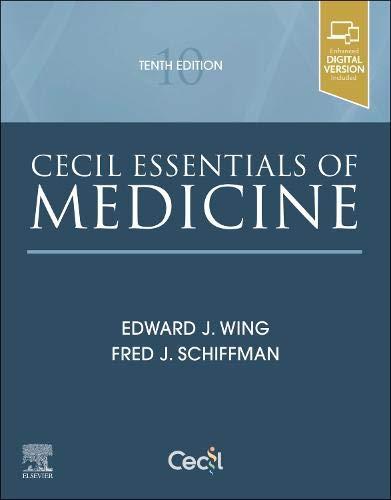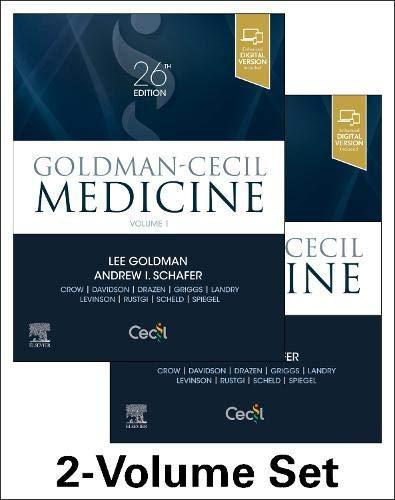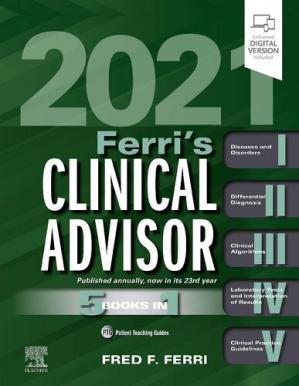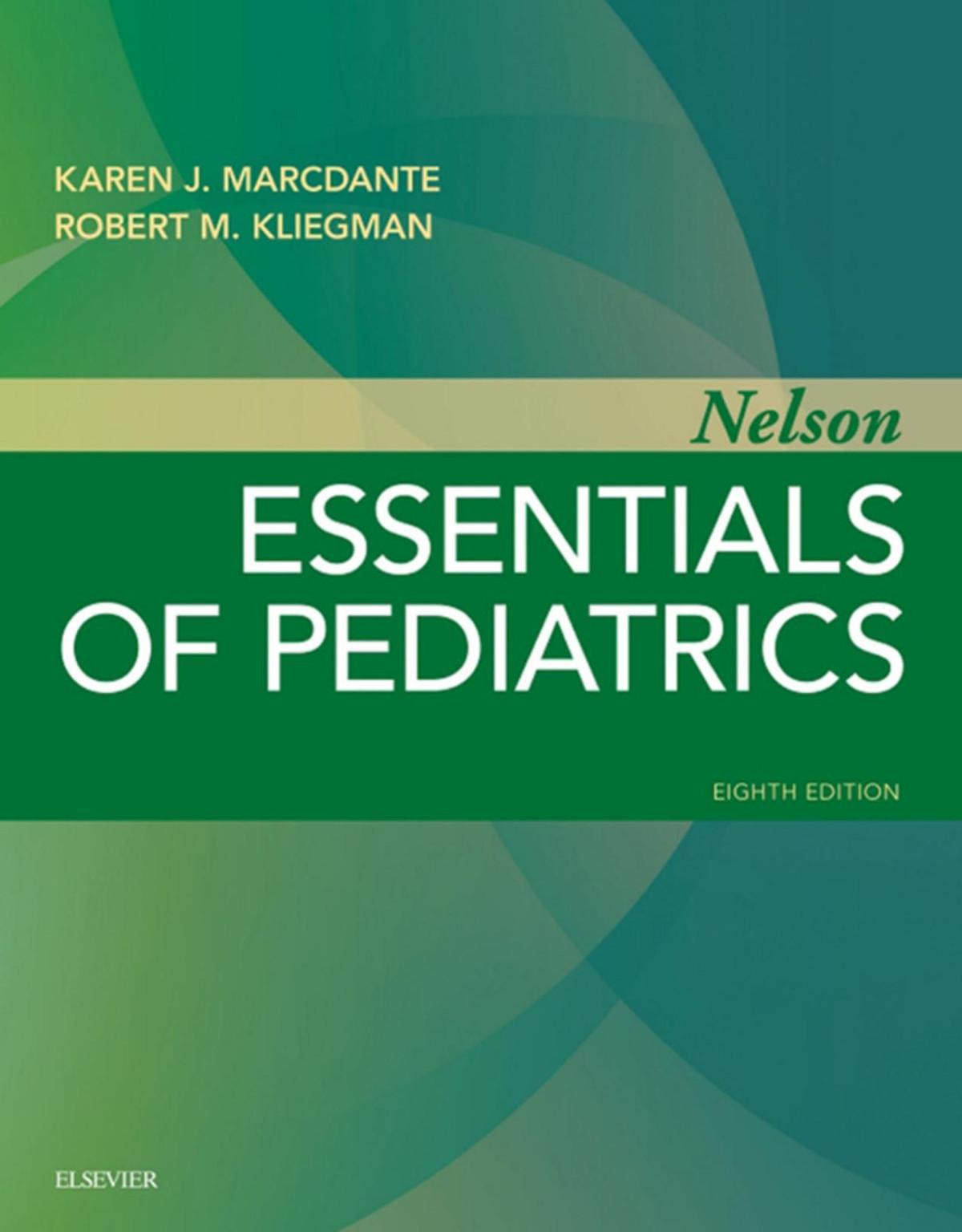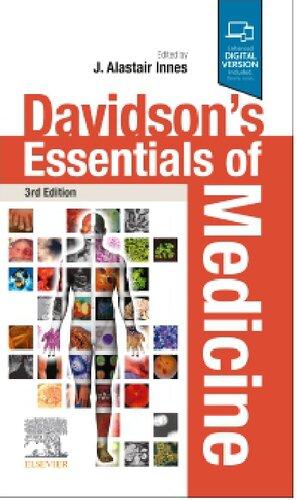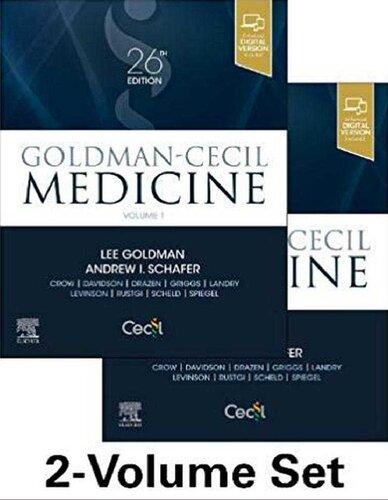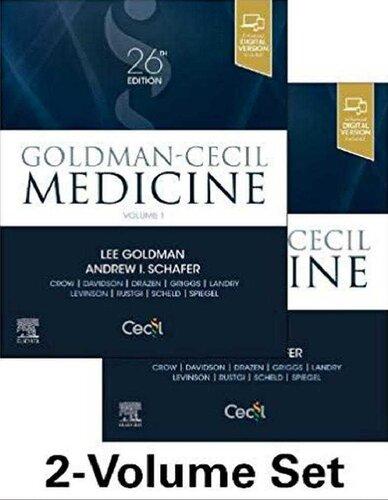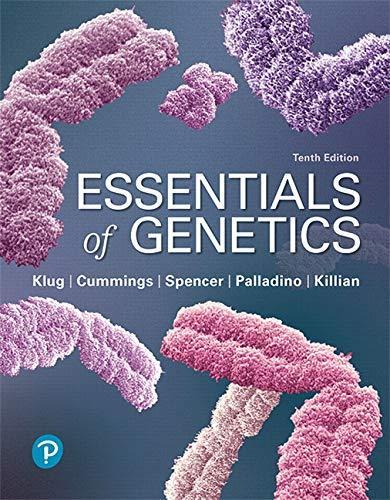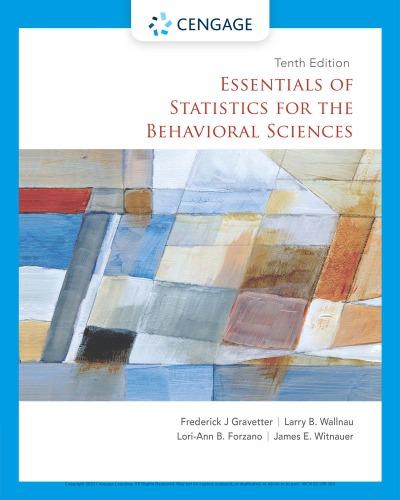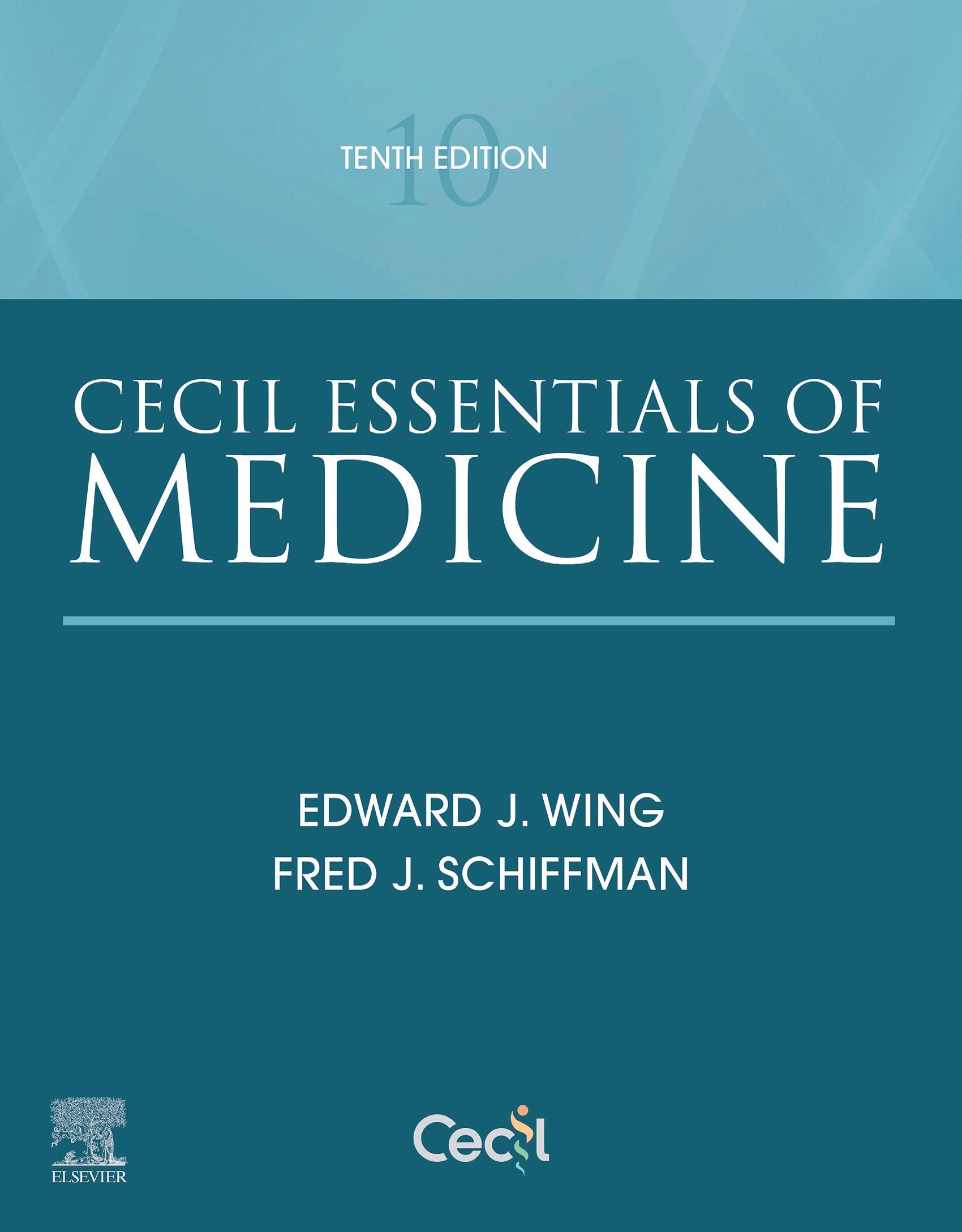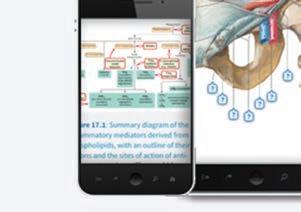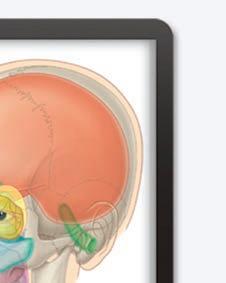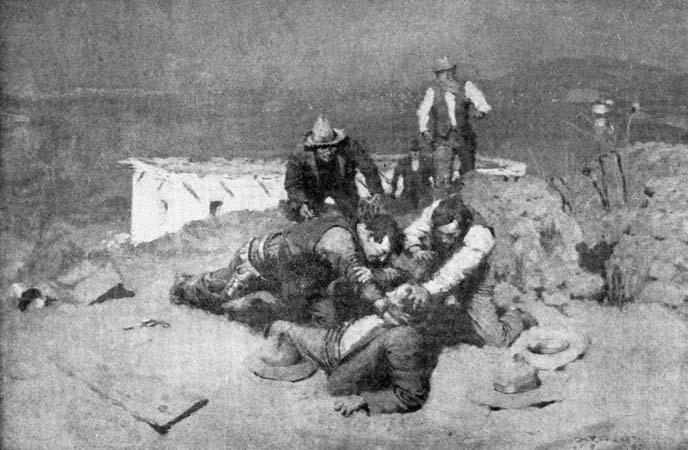ABOUT THE EDITORS
Dr. Edward J. Wing was an editor of Cecil Essentials of Medicine, editions 8 and 9, and is the lead editor of edition 10. He graduated from Williams College in 1967 and from the Harvard Medical School in 1971. He was a resident in Internal Medicine at the Peter Bent Brigham and completed an Infectious Diseases Fellowship at Stanford University. Joining the faculty at the University of Pittsburgh in 1975, he focused his NIH-funded research on mechanisms of cell-mediated immunity as well as various clinical aspects of Infectious Diseases. From 1990 to 1998, the University and UPMC appointed him as Physician-in-Chief at Montefiore Hospital, then Chief of Infectious Diseases, and finally Interim Chair of Medicine.
In 1998, Dr. Wing became Chair of Medicine at Brown University (1998–2008) where he consolidated the department across hospitals, practice plans, and training programs. As Dean of Medicine and Biological Sciences at Brown University (2008–2013) he strengthened ties with affiliated hospitals (Lifespan and Care New England), increased research, and oversaw the construction of a new medical school building. International exchange programs with medical schools in Kenya, the Dominican Republic, and Haiti were established during his years as chairman and dean. Dr. Wing has cared for patients with HIV since the beginning of the epidemic in outpatient clinics. He continues to be active in research, clinical care, and teaching.
Dr. Fred J. Schiffman, who along with Dr. Edward Wing is editor of Cecil Essentials of Medicine, 10th edition, attended Wagner College and then the New York University School of Medicine, from which he graduated in 1973. He performed his early house staff training at YaleNew Haven Hospital and then spent two years at the National Cancer Institute. He returned to Yale as Chief Medical Resident followed by a hematology fellowship. He became Medical Director of Yale’s Primary Care Center before coming to Brown University in 1983, where he has been a leader in the medical residency program as well as Associate Physician-in-Chief at The Miriam Hospital.
Dr. Schiffman holds The Sigal Family Professorship in Humanistic Medicine at The Warren Alpert Medical School of Brown University. His scholarly interests include the structure and function of the human spleen and the intersection of the arts and medical care. He has directed or championed many projects and programs, including those that encourage and reinforce wellness and resilience in patients, families, and caregivers. He began a novel program that places medical students and physicians with other nonmedical professionals as they share in the viewing of works of art in the Museum of the Rhode Island School of Design. Dr. Schiffman recently led a Brown University edX course entitled, “Artful Medicine: Art’s Power to Enrich Patient Care,” with worldwide participation. Dr. Schiffman has also edited texts on hematologic pathophysiology, consultative hematology, and the anemias.
Jinnette Dawn Abbott, MD
Professor of Medicine
Director
Interventional Cardiology Fellowship
Cardiology
Brown Medical School
Associate Chief
Faculty Development and Academic Advancement
Cardiovascular Institute
Lifespan Providence, Rhode Island
Rajiv Agarwal, MD Professor of Medicine
Indiana University Indianapolis, Indiana
Marwa Al-Badri, MD
Clinical Research Fellow
Clinical, Behavioral, and Outcome
Research
Joslin Diabetes Center Boston, Massachusetts
Hyeon-Ju Ryoo Ali, MD
Cardiology Fellow
Houston Methodist Hospital Houston, Texas
Jason M. Aliotta, MD
Associate Professor of Medicine
Division of Pulmonary, Critical Care and Sleep Medicine
Warren Alpert Medical School
Brown University Providence, Rhode Island
Khaldoun Almhanna, MD, MPH
Associate Professor
Hematology and Oncology
Warren Alpert Medical School
Brown University
Providence, Rhode Island
Mohanad T. Al-Qaisi, MD
Gastroenterology and Hepatology
University of Arizona College of Medicine
Banner University Medical Center–Phoenix
Phoenix VA Medical Center
Phoenix, Arizona
Zuhal Arzomand, MD
Rheumatologist
Northern Virginia Arthritis and Rheumatology
Alexandria, Virginia
Akwi W. Asombang, MD, MPH
Assistant Professor of Medicine
Division of Gastroenterology and Hepatology
Warren Alpert Medical School
Brown University
Providence, Rhode Island
Su N. Aung, MD, MPH
Assistant Professor
Division of Infectious Diseases
University of California San Francisco
San Francisco, California
Christopher G. Azzoli, MD
Associate Professor of Medicine
Warren Alpert Medical School
Brown University
Providence, Rhode Island
Christina Bandera, MD
Chief
Obstetrics and Gynecology
Director of The Center for Gynecologic Cancers
Rhode Island Hospital and The Miriam Hospital
Clinical Assistant Professor of Surgery
Warren Alpert Medical School
Brown University
Providence, Rhode Island
Debasree Banerjee, MD
Assistant Professor
Warren Alpert Medical School
Brown University
Pulmonary, Critical Care and Sleep Medicine Staff Physician
Rhode Island Hospital and Miriam Hospital
Providence, Rhode Island
Mashal Batheja, MD
Chief of Hepatology
Gastroenterology and Hepatology
Phoenix VA Medical Center
Clinical Assistant Professor
University of Arizona–Phoenix Phoenix, Arizona
Jeffrey J. Bazarian, MD, MPH
Professor of Emergency Medicine
University of Rochester, School of Medicine and Dentistry
Rochester, New York
Selim R. Benbadis, MD
Professor Neurology
University of South Florida
Tampa, Florida
Ivor J. Benjamin, MD, FAHA, FACC
Professor of Medicine
Medical College of Wisconsin
Milwaukee, Wisconsin
Eric Benoit, MD
Assistant Professor of Surgery
Tufts University School of Medicine
Division of Trauma & Acute Care Surgery
Lahey Hospital & Medical Center
Burlington, Massachusetts
Marcie G. Berger, MD
Professor
Cardiovascular Medicine
Medical College of Wisconsin
Milwaukee, Wisconsin
Clemens Bergwitz, MD
Associate Professor of Medicine
Section Endocrinology and Metabolism
Department of Medicine
Yale School of Medicine
New Haven, Connecticut
Nancy Berliner, MD
Chief
Division of Hematology
Medicine
Brigham and Women’s Hospital
H. Franklin Bunn Professor
Medicine
Harvard Medical School
Boston, Massachusetts
Jeffrey S. Berns, MD
Professor of Medicine and Pediatrics
Renal, Electrolyte and Hypertension Division
Perelman School of Medicine at the University of Pennsylvania
Philadelphia, Pennsylvania
Pooja Bhadbhade, DO
Assistant Professor
Department of Internal Medicine
Division of Allergy, Clinical Immunology and Rheumatology
University of Kansas Medical Center
Kansas City, Kansas
Ratna Bhavaraju-Sanka, MD
Associate Professor of Neurology
Department of Neurology
University of Texas Health Science Center at San Antonio
San Antonio, Texas
Tanmayee Bichile, MD
Rheumatologist
Lupus Center of Excellence
Allegheny Health Network
Pittsburgh, Pennsylvania
Assistant Professor
Drexel University College of Medicine Philadelphia, Pennsylvania
Ariel E. Birnbaum, MD
Assistant Professor of Medicine
Warren Alpert Medical School
Brown University
Providence, Rhode Island
Charles M. Bliss, Jr., MD
Clinical Assistant Professor of Medicine
Section of Gastroenterology
Department of Medicine
Boston University School of Medicine
Boston, Massachusetts
Andrew S. Blum, MD, PhD
Professor Neurology
Warren Alpert Medical School
Brown University
Director
Comprehensive Epilepsy Program
Rhode Island Hospital Providence, Rhode Island
Bryan J. Bonder, MD
Hematology and Oncology
University Hospitals Cleveland Medical Center Cleveland, Ohio
Russell Bratman, MD
Assistant Professor of Medicine
Department of Medicine
Division of Endocrinology
Warren Alpert Medical School
Brown University
Providence, Rhode Island
Glenn D. Braunstein, MD
Professor of Medicine
Cedars-Sinai Medical Center
Professor of Medicine Emeritus
The David Geffen School of Medicine at UCLA
Los Angeles, California
Alma M. Guerrero Bready, MD
Attending Physician
Division of Hospital Medicine
Rhode Island Hospital Providence, Rhode Island
Richard Bungiro, PhD
Senior Lecturer
Molecular Microbiology & Immunology
Brown University
Providence, Rhode Island
Anna Marie Burgner, MD, MEHP
Assistant Professor of Medicine
Vanderbilt University Medical Center
Nashville, Tennessee
Jonathan Cahill, MD
Associate Professor
Neurology
Warren Alpert Medical School
Brown University
Providence, Rhode Island
Andrew Canakis, DO
Resident Physician
Department of Medicine
Boston University School of Medicine
Boston, Massachusetts
Benedito A. Carneiro, MD, MS
Associate Director
Division of Hematology Oncology
Department of Medicine
Warren Alpert Medical School
Brown University
Providence, Rhode Island
Brian Casserly, MD
Respiratory Physician
Pulmonary, Critical Care and Sleep Medicine University Hospital Limerick Limerick, Ireland
Abdullah Chahin, MD, MA, MSc
Assistant Professor in Medicine
Department of Internal Medicine
Warren Alpert Medical School
Brown University
Providence, Rhode Island
Philip A. Chan, MD
Associate Professor of Medicine
Brown University
Providence, Rhode Island
Kimberle Chapin, MD
Director of Microbiology
Department of Pathology
Rhode Island Hospital
Professor of Medicine
Professor of Pathology
Warren Alpert Medical School
Brown University
Providence, Rhode Island
William P. Cheshire, Jr., MD
Professor of Neurology
Mayo Clinic
Jacksonville, Florida
Waihong Chung, MD, PhD
Fellow
Gastroenterology
Rhode Island Hospital
Providence, Rhode Island
Emma Ciafaloni, MD
Professor of Neurology and Pediatrics
University of Rochester Rochester, New York
Joaquin E. Cigarroa, MD
Division Head of Cardiology
Professor of Medicine
Knight Cardiovascular Institute
Oregon Health and Sciences University Portland, Oregon
Michael P. Cinquegrani, MD
Professor of Medicine
Cardiovascular Medicine
Medical College of Wisconsin Milwaukee, Wisconsin
Andreea Coca, MD, MPH
Associate Professor of Medicine
Rheumatology
University of Pittsburgh
Pittsburgh, Pennsylvania
Harvey Jay Cohen, MD
Walter Kempner Professor of Medicine
Center for the Study of Aging and Human Development
Duke University School of Medicine
Durham, North Carolina
Scott Cohen, MD, MPH
Medical Director
Wisconsin Adult Congenital Heart Disease Program
Associate Professor of Internal Medicine and Pediatrics
Sections of Cardiovascular Medicine and Pediatric Cardiology
Medical College of Wisconsin
Milwaukee, Wisconsin
Beatrice P. Concepcion, MD, MS
Assistant Professor of Medicine
Vanderbilt University Medical Center
Nashville, Tennessee
Nathan T. Connell, MD, MPH
Associate Physician
Hematology Division
Brigham and Women’s Hospital
Assistant Professor of Medicine
Harvard Medical School Boston, Massachusetts
Maria Constantinou, MD
Assistant Professor of Medicine
Warren Alpert Medical School Brown University Providence, Rhode Island
Roberto Cortez, MD
Senior Resident Surgery
Rhode Island Hospital/Warren Alpert Medical School
Brown University Providence, Rhode Island
Timothy J. Counihan, MD, FRCPI
Hon. Professor in Medicine School of Medicine
National University of Ireland Galway Galway, Ireland
Anne Haney Cross, MD Professor Neurology Washington University St. Louis, Missouri
Cheston B. Cunha, MD, FACP
Associate Professor of Medicine
Medical Director, Antimicrobial Stewardship
Infectious Disease Division
Warren Alpert Medical School
Brown University Providence, Rhode Island
Joanne S. Cunha, MD
Assistant Professor of Medicine
Warren Alpert Medical School
Brown University Director
Rheumatology Fellowship Program at Brown University Providence, Rhode Island
Susan Cu-Uvin, MD Professor of Obstetrics and Gynecology Professor of Medicine
Brown University Providence, Rhode Island
Noura M. Dabbouseh, MD
Amita Health Heart and Vascular Hinsdale, Illinois
Kwame Dapaah-Afriyie, MD, MBA
Professor of Medicine (Clinician Educator) Brown University—Miriam Hospital Providence, Rhode Island
Erin M. Denney-Koelsch, MD
Associate Professor of Medicine & Pediatrics Medicine
University of Rochester Rochester, New York
Andre De Souza, MD
Assistant Professor of Medicine
Division of Hematology Oncology
Department of Medicine
Warren Alpert Medical School
Brown University Providence, Rhode Island
An S. De Vriese, MD, PhD
Division of Nephrology and Infectious Diseases
AZ Sint-Jan Brugge, Brugge, and Ghent University Ghent, Belgium
Neal D. Dharmadhikari, MD Fellow
Gastroenterology
Boston Medical Center Boston, Massachusetts
Leah Dickstein, MD
Fellow in Neurocritical Care
Department of Neurosurgery Division of Neurocritical Care
David Geffen School of Medicine at UCLA Los Angeles, California
Don Dizon, MD, FACP, FASCO Director of Womens’ Cancers Lifespan Cancer Institute Director of Medical Oncology
Rhode Island Hospital Professor of Medicine
Warren Alpert Medical School
Brown University Providence, Rhode Island
Robyn T. Domsic, MD, MPH
Associate Professor of Medicine
Division of Rheumatology and Clinical Immunology
University of Pittsburgh Pittsburgh, Pennsylvania
Kim A. Eagle, MD
Albion Walter Hewlett Professor of Internal Medicine
Department of Internal Medicine University of Michigan
Ann Arbor, Michigan
Michael G. Earing, MD
Director
University of Chicago Adult Congenital Heart Disease Program
Professor
Internal Medicine and Pediatrics
Sections of Adult Cardiovascular Medicine and Pediatric Cardiology
University of Chicago
Chicago, Illinois
Pamela Egan, MD
Assistant Professor of Medicine
Department of Medicine
Warren Alpert Medical School
Brown University
Hematologist
Division of Hematology and Oncology
Rhode Island Hospital
Providence, Rhode Island
Wafik S. El-Deiry, MD, PhD, FACP
American Cancer Society Research Professor Director of the Cancer Center at Brown University and Joint Program in Cancer Biology
Mencoff Family University Professor of Medical Science
Professor of Pathology and Laboratory Medicine
Warren Alpert Medical School
Brown University Providence, Rhode Island
Mitchell S. V. Elkind, MD, MS
Professor
Neurology
Vagelos College of Physicians and Surgeons
Professor
Epidemiology
Mailman School of Public Health
Columbia University
New York, New York
Tarra B. Evans, MD
Gynecologic Oncologist
The Center for Gynecologic Cancers
Rhode Island Hospital
Clinical Assistant Professor of Surgery
Warren Alpert Medical School
Brown University
Providence, Rhode Island
Michael B. Fallon, MD
Professor of Medicine
Gastroenterology, Hepatology and Nutrition
Chair
Department of Internal Medicine
University of Arizona–Phoenix
Phoenix, Arizona
Dimitrios Farmakiotis, MD
Assistant Professor of Medicine
Internal Medicine, Infectious Diseases
Warren Alpert Medical School
Brown University Providence, Rhode Island
Francis A. Farraye, MD
Director Professor of Medicine
Inflammatory Bowel Disease Center
Mayo Clinic Jacksonville, Florida
Ronan Farrell, MD Fellow
Gastroenterology
Brown University Providence, Rhode Island
Mary Anne Fenton, MD
Clinical Associate Professor
Department of Medicine
Warren Alpert Medical School
Brown University
Providence, Rhode Island
Fernando C. Fervenza, MD, PhD
Professor of Medicine
Nephrology and Hypertension
Mayo Clinic Rochester, Minnesota
Sean Fine, MD
Assistant Professor
Gastroenterology
Brown University Providence, Rhode Island
Arkadiy Finn, MD
Assistant Professor of Medicine
Clinician Educator
Warren Alpert Medical School
Brown University
Division of Hospital Medicine
The Miriam Hospital Providence, Rhode Island
Timothy Flanigan, MD Professor of Medicine
Warren Alpert Medical School
Brown University
Providence, Rhode Island
Brisas M. Flores, MD Fellow
Gastroenterology
Boston Medical Center
Boston, Massachusetts
Andrew E. Foderaro, MD
Assistant Professor in Medicine
Clinician Educator
Pulmonary, Critical Care and Sleep Medicine
Brown University
Providence, Rhode Island
Theodore C. Friedman, MD, PhD Chairman
Department of Internal Medicine
Chief of the Division of Endocrinology, Metabolism and Molecular Medicine
Endowed Professor of Cardio-Metabolic Medicine
Charles R. Drew University of Medicine & Science Professor of Medicine
UCLA
Los Angeles, California
Joseph Metmowlee Garland, MD, AAHIVM
Associate Professor of Medicine
Warren Alpert Medical School
Brown University
Providence, Rhode Island
Eric J. Gartman, MD
Associate Professor of Medicine
Division of Pulmonary, Critical Care, and Sleep Medicine
Warren Alpert Medical School
Brown University
Staff Physician
Division of Pulmonary, Critical Care, and Sleep Medicine
Providence VA Medical Center
Providence, Rhode Island
Abdallah Geara, MD
Assistant Professor of Clinical Medicine
Renal-Electrolyte and Hypertension
University of Pennsylvania Philadelphia, Pennsylvania
Raul Macias Gil, MD
Infectious Disease Fellow
Division of Infectious Diseases
Brown University Providence, Rhode Island
Timothy Gilligan, MD, FASCO
Associate Professor of Medicine
Vice-Chair for Education
Hematology and Medical Oncology Department
Cleveland Clinic Taussig Cancer Institute Cleveland, Ohio
Michael Raymond Goggins, MB BCh
BAO, MRCPI
Medicine
University Hospital Limerick Limerick, Ireland
Geetha Gopalakrishnan, MD
Associate Professor
Department of Medicine
Division of Endocrinology
Warren Alpert Medical School
Brown University Providence, Rhode Island
Vidya Gopinath, MD
Assistant Professor of Medicine, ClinicianEducator
Warren Alpert Medical School
Brown University
Providence, Rhode Island
Susan L. Greenspan, MD, FACP
Division of Geriatric Medicine
University of Pittsburgh School of Medicine
Pittsburgh, Pennsylvania
Osama Hamdy, MD, PhD
Medical Director
Obesity Clinical Program Endocrinology
Joslin Diabetes Center
Associate Professor of Medicine
Harvard Medical School
Boston, Massachusetts
Johanna Hamel, MD
Assistant Professor of Neurology, Pathology and Laboratory Medicine
University of Rochester Medical Center Rochester, New York
Sajeev Handa, MD, SFHM
Assistant Professor of Medicine
Chief
Hospital Medicine
Rhode Island/Miriam & Newport Hospitals Providence, Rhode Island
Mitchell T. Heflin, MD, MHS Professor of Medicine
Professor in the School of Nursing
Associate Dean for Interprofessional Education and Care (IPEC)
Duke University School of Medicine
Durham, North Carolina
Robert G. Holloway, MD, MPH
Professor
Department of Neurology
University of Rochester Medical Center Rochester, New York
Christopher S. Huang, MD
Clinical Associate Professor of Medicine
Department of Medicine
Section of Gastroenterology
Boston University School of Medicine
Boston, Massachusetts
Zilla Hussain, MD
Assistant Professor of Medicine and Medical Sciences
Warren Alpert Medical School
Brown University
Esophageal Disorders
Gastroenterology
Lifespan Physicians Group
Providence, Rhode Island
T. Alp Ikizler, MD
Catherine McLaughlin-Hakim Chair Professor of Medicine
Vanderbilt University Medical Center Nashville, Tennessee
Iris Isufi, MD
Assistant Professor of Medicine (Hematology)
Internal Medicine
Yale University
New Haven, Connecticut
Carlayne E. Jackson, MD Professor of Neurology and Otolaryngology Department of Neurology
University of Texas Health Science Center
San Antonio, Texas
Paul G. Jacob, MD, MPH
Assistant Professor Division of Infectious Diseases
Vanderbilt University Medical Center Nashville, Tennessee
Matthew D. Jankowich, MD
Associate Professor of Medicine
Pulmonary, Critical Care and Sleep Medicine
Warren Alpert Medical School
Brown University
Providence VA Medical Center
Providence, Rhode Island
Niels V. Johnsen, MD, MPH
Assistant Professor Department of Urology
Vanderbilt University Medical Center
Nashville, Tennessee
Jessica E. Johnson, MD
Infectious Diseases
West Virginia University School of Medicine
Morgantown, West Virginia
Rayford R. June, MD
Assistant Professor of Medicine Division of Rheumatology Department of Medicine
Penn State College of Medicine
Hershey, Pennsylvania
Tareq Kheirbek, MD, ScM, FACS
Assistant Professor of Surgery
Clinical Educator
Surgery
Brown University Providence, Rhode Island
Alok A. Khorana, MD, FACP, FASCO
Sondra and Stephen Hardis Endowed Chair in Oncology Research
Taussig Cancer Institute
Cleveland Clinic
Cleveland, Ohio
Sena Kilic, MD
Clinical Associate Division of Cardiology
Knight Cardiovascular Institute
Oregon Health & Science University Portland, Oregon
David Kim, MD Chief Resident Surgery
Rhode Island Hospital/Warren Alpert Medical School
Brown University Providence, Rhode Island
James Kleczka, MD Associate Professor Department of Medicine Medical College of Wisconsin Milwaukee, Wisconsin
James R. Klinger, MD Professor of Medicine
Pulmonary, Critical Care, and Sleep Medicine
Warren Alpert Medical School
Brown University
Providence, Rhode Island
Patrick Koo, MD, ScM
Associate Professor of Medicine (Affiliate) University of Tennessee Health Science Center College of Medicine
Erlanger Hospital Department of Medicine
Chattanooga, Tennessee
Pooja Koolwal, MD
Assistant Professor Department of Internal Medicine
Division of Nephrology
UT Southwestern Medical Center
Dallas, Texas
Mary P. Kotlarczyk, PhD
Assistant Professor of Medicine
Division of Geriatric Medicine
University of Pittsburgh School of Medicine
Pittsburgh, Pennsylvania
Nicole M. Kuderer, MD
Chief Medical Officer
Medicine
Advanced Cancer Research Group
Seattle, Washington
Awewura Kwara, MD
Professor Department of Medicine
University of Florida College of Medicine
Gainesville, Florida
Jennifer M. Kwon, MD, MPH Professor Neurology
University of Wisconsin School of Medicine and Public Health
Madison, Wisconsin
Richard A. Lange, MD, MBA
President
Texas Tech University Health Sciences Center El Paso
Dean
Paul L. Foster School of Medicine El Paso, Texas
Jerome Larkin, MD Associate Professor of Medicine
Infectious Diseases
Warren Alpert Medical School
Brown University
Providence, Rhode Island
Alfred I. Lee, MD, PhD
Associate Professor of Medicine
Hematology/Oncology Division
Yale School of Medicine
New Haven, Connecticut
Daniel J. Levine, MD Director
Advanced Heart Failure
Cardiology
Brown University
Providence, Rhode Island
David E. Lewandowski, MD
Cardiology Fellow
Cardiology
Medical College of Wisconsin Milwaukee, Wisconsin
Kelly V. Liang, MD, MS
Assistant Professor of Medicine
Renal-Electrolyte Division
University of Pittsburgh Pittsburgh, Pennsylvania
Kimberly P. Liang, MD, MS
Assistant Professor of Medicine
Rheumatology and Clinical Immunology
University of Pittsburgh Pittsburgh, Pennsylvania
David R. Lichtenstein, MD
Director of Endoscopy
Gastroenterology
Boston University Medical Center
Associate Professor of Medicine
Gastroenterology
Boston Medical Center
Boston, Massachusetts
Douglas W. Lienesch, MD
Chief
Rheumatology Division
Christiana Care Health System
Newark, Delaware
Geoffrey S.F. Ling, MD, PhD
Professor of Neurology
Johns Hopkins Baltimore, Maryland
Ester Little, MD, FACP
Assistant Professor of Medicine
Department of Medicine University of Arizona
Hepatologist
Banner Advanced Liver Disease and Transplant Institute
Banner University Medical Center Phoenix Phoenix, Arizona
Yi Liu, MD
Resident Physician Medicine
Beth Israel Lahey Health Burlington, Massachusetts
Nicole L. Lohr, MD, PhD
Associate Professor
Medicine
Medical College of Wisconsin Milwaukee, Wisconsin
John R. Lonks, MD, FACP, FIDSA, FSHEA
Associate Professor of Medicine
Department of Medicine
Warren Alpert Medical School
Brown University Providence, Rhode Island
Gary H. Lyman, MD, MPH
Professor
Public Health Sciences
Fred Hutchinson Cancer Research Center Professor
Medicine
University of Washington Seattle, Washington
Jeffrey M. Lyness, MD
Senior Associate Dean for Academic Affairs and Professor of Psychiatry & Neurology
Office of Academic Affairs
University of Rochester School of Medicine & Dentistry
Rochester, New York
Shane Lyons, MD, MRCPI, MRCP(UK)
Specialist Registrar in Neurology Department of Neurology
St James’s Hospital
Dublin, Ireland
Diana Maas, MD
Associate Professor of Medicine
Division of Endocrinology
Medical College of Wisconsin Milwaukee, Wisconsin
Talha A. Malik, MD, MSPH
Assistant Professor of Medicine
Gastroenterology and Hepatology
Mayo Clinic Arizona Scottsdale, Arizona
Sonia Manocha, MD
Rheumatologist
Lupus Center of Excellence
Allegheny Health Network Pittsburgh, Pennsylvania
Assistant Professor
Drexel University College of Medicine Philadelphia, Pennsylvania
Susan Manzi, MD, MPH
Chair
Medicine Institute Director
Lupus Center of Excellence
Allegheny Health Network
Professor of Medicine
Temple University School of Medicine Philadelphia, Pennsylvania
Frederick J. Marshall, MD
Professor
Neurology
University of Rochester Rochester, New York
F. Dennis McCool, MD
Professor of Medicine
Division of Pulmonary and Critical Care Medicine
Warren Alpert Medical School
Brown University Providence, Rhode Island
Russell J. McCulloh, MD
Associate Professor Pediatrics
University of Nebraska College of Medicine
Division Chief
Pediatric Hospital Medicine
University of Nebraska Medical Center Omaha, Nebraska
Kelly McGarry, MD, FACP
Professor of Medicine
Warren Alpert Medical School
Brown University Providence, Rhode Island
Eavan Mc Govern, MD, PhD
Consultant Neurologist
Senior Clinical Lecturer
Beaumont Hospital
Royal College of Surgeons in Ireland Ireland
Robin L. McKinney, MD
Assistant Professor of Pediatrics
Pediatric Critical Care Medicine
Warren Alpert Medical School
Brown University Providence, Rhode Island
Anthony Mega, MD
Associate Professor of Medicine
Program Director Hematology/Oncology Fellowship
Division Hematology/Oncology
Warren Alpert Medical School
Brown University
Lifespan Cancer Institute
Providence, Rhode Island
Shivang Mehta, MD
Assistant Professor of Medicine
Gastroenterology, Hepatology, and Nutrition
Department of Internal Medicine
University of Arizona–Phoenix Phoenix, Arizona
Douglas F. Milam, MD
Associate Professor
Department of Urology
Vanderbilt University Medical Center
Nashville, Tennessee
Maria D. Mileno, MD
Associate Professor of Medicine
Division of Infectious Diseases
Warren Alpert Medical School
Brown University
Attending Physician, Infectious Disease Consultant
Brown Medicine
The Miriam Hospital
Former Director of Travel Medicine Services Providence, Rhode Island
Abhinav Kumar Misra, MBBS, MD
Assistant Professor of Medicine
Pulmonary, Critical Care and Sleep Medicine
Warren Alpert Medical School
Brown University Providence, Rhode Island
Orson W. Moe, MD Professor
Internal Medicine and Physiology Division of Nephrology Director
Charles and Jane Pak Center for Mineral Metabolism and Clinical Research Chief Division of Nephrology
UT Southwestern Medical Center Dallas, Texas
Niveditha Mohan, MBBS
Associate Professor Department of Medicine Division of Rheumatology and Clinical Immunology
University of Pittsburgh Pittsburgh, Pennsylvania
Larry W. Moreland, MD
Margaret J. Miller Endowed Professor of Arthritis Research
Division of Rheumatology and Clinical Immunology
Professor of Medicine, Immunology, Clinical and Translational Science Chief
Division of Rheumatology and Clinical Immunology
University of Pittsburgh Pittsburgh, Pennsylvania
Alan R. Morrison, MD, PhD
Assistant Professor of Medicine
Medicine (Cardiology)
Warren Alpert Medical School
Brown University
Providence, Rhode Island
Steven F. Moss, MD Professor of Medicine
Division of Gastroenterology and Hepatology
Warren Alpert Medical School
Brown University
Providence, Rhode Island
Christopher J. Mullin, MD, MHS
Assistant Professor of Medicine, Clinician Educator
Pulmonary, Critical Care, and Sleep Medicine
Warren Alpert Medical School
Brown University Providence, Rhode Island
Sinéad M. Murphy, MB, BCh, MD, FRCPI
Consultant Neurologist Neurology
Tallaght University Hospital
Clinical Associate Professor Medicine
University of Dublin, Trinity College Dublin, Ireland
Sagarika Nallu, MD, FAAP, FAAN, FAASM
Director of Pediatric Sleep Medicine Department of Pediatrics University of South Florida Tampa, Florida
Javier A. Neyra, MD, MSCS
Assistant Professor of Medicine Director
Critical Care Nephrology
Division of Nephrology, Bone and Mineral Metabolism
University of Kentucky Medical Center Lexington, Kentucky
Ghaith Noaiseh, MD Associate Professor
Department of Internal Medicine Division of Allergy, Clinical Immunology and Rheumatology
University of Kansas Kansas City, Kansas
Thomas A. Ollila, MD
Assistant Professor of Medicine
Warren Alpert Medical School
Brown University
Providence, Rhode Island
Steven M. Opal, MD
Clinical Professor of Medicine
Infectious Diseases Division
Department of Medicine
Warren Alpert Medical School
Brown University
Rhode Island Hospital
Providence, Rhode Island
Biff F. Palmer, MD
Professor of Internal Medicine
Internal Medicine
University of Texas Southwestern Medical Center
Dallas, Texas
Jen Jung Pan, MD, PhD
Associate Professor of Medicine
Gastroenterology and Hepatology
Department of Internal Medicine
University of Arizona–Phoenix Phoenix, Arizona
Anna Papazoglou, MD
Clinical Instructor
Postdoctoral Research Scholar
Division of Rheumatology and Clinical Immunology
University of Pittsburgh Pittsburgh, Pennsylvania
Aric Parnes, MD
Attending Hematologist Medicine
Brigham and Women’s Hospital
Assistant Professor
Harvard Medical School
Boston, Massachusetts
Nayan M. Patel, DO, MPH
Assistant Professor of Medicine
Gastroenterology and Hepatology
Department of Internal Medicine
University of Arizona–Phoenix
Phoenix, Arizona
Ari Pelcovits, MD
Department of Medicine
Division of Hematology and Oncology
Warren Alpert Medical School
Brown University
Providence, Rhode Island
Another random document with no related content on Scribd:
contributory negligence, propinquities, clergyman’s sore throat, equilateral strangulation and collar galls, veracity, pessimism, Scylla and Charybdis, stuttering, processions of equine oxen and similar phenomena, insubordination, altitude, consanguinity, chalcedony, irritation of the Ephemeridæ, symmetry, vocalization, mammalia, clairvoyance, inertia, acrimony, persecution, paresis, paraphernalia, perspective, perspiration, tyranny, architecture and entire absence of mind—take another dose!” He cast an appealing glance around. “I can’t get at what Jeff’s trying to say,” declared Mr. Pringle with some asperity, “but if I could, I’m damned if I couldn’t tell it! Speak up! Play it out on the typewriter.”
Acting upon this hint, Aughinbaugh turned to the typewriter and clattered furiously on the keys. He took off two sheets and spread them on the table, face to face, so that one sheet covered all of the other but the first two lines. “There!” he said, pointing. Beebe read aloud:
“‘Nowisthetimeforallgoodmenandtruetocometothe aidoftheparty.
A quick move by the enemy will jeopardize six fine gunboats.’”
“He spoke twice—once in each letter,” said George Aughinbaugh, “of learning to use the typewriter. He gave a speed sentence that he had made up, containing the entire alphabet. These are similar sentences, used by nearly every one who learns to typewrite. Jeff was familiar with them. He practised the first one by the hour. I gave him the second one the last night he was here. He is calling on us to come to his help; he is warning us to be careful, that one unconsidered move on our part, ‘a quick move,’ will be dangerous to him. Taken in connection with the other allusions in his letter, and to things that I know outside of his letter, it probably means that such a quick move might be fatal to him. He is imprisoned—not legally; secretly—and in great danger. Of course, parts of his letter are only padding to introduce and join plausibly the vital allusions so that his
captors would allow the letter to go. The allusions are not consecutive. When he speaks of——”
“Hold on, old man; you’re getting all balled up again,” said Pringle. “Suppose, first of all, you tell us, as clearly as you can, exactly what you understand him to mean, just as if he had written it to you direct, without any parables. Then you can explain to us how you got at it, afterwards.”
George walked the room, rearranged his thoughts and, in the process, mastered his agitation.
Finally he faced the three friends and said: “He is in prison, in Juarez, the victim of a conspiracy. He is in utmost danger; he is closely guarded; the persons involved have such powerful reasons for holding him that they would kill him rather than allow him to be rescued. What we do must be done with the greatest caution; his guards must not have the slightest suspicion that a rescue is attempted, or planned, or possible, till it is carried out. In addition to this he tells us that we are to communicate with him by means of the personal columns of the El Paso papers——”
“I got that,” said Pringle, “but that is about all I did get. Of course, we all figured it out that we were to come to you for instructions, and that there was something about a typewriter we wanted to look into. That was plain enough. There, I’m talking with my mouth. Go on!”
“And, in his great danger and distress, he sends you—to Mr. Pringle first, and then to all of you—a last and tenderest farewell, and the strong assurance of his faith that you will do for him all that men can do.”
“Good God!” exclaimed Leo. “And was there no hint of who it was that had done this?”
“There was!” said Aughinbaugh, with sparkling eyes. “It was two well-known, wealthy and influential El Paso men—the Honorable S. S. Thorpe and Sam Patterson.”
“Show me!” said Pringle—“though I begin to see.”
“Half the letter is taken up by comment on the play of Julius Cæsar, which he and I had been reading together,” said George. “He tells us plainly, over and over, in different words, to look in it for meanings beneath the surface. You remember that?”
“Yes,” said Billy.
“Well, the play hinges upon the conspiracy of Brutus and Cassius—a conspiracy carried out on the Ides of March. Look!” He moved the paper to expose another line:
RememberMarch,theIdesofMarchremember!
“Not till then did I remember that the sixteenth of March, the day on which Jeff disappeared, was—not indeed the Ides of March, the fifteenth, but devilish close to it, close enough. So what he says is: ‘George, remember—think carefully—remember exactly what took place the day you saw me last.’
“He left my rooms just before midnight. And at midnight exactly, as sworn to by many people, at a spot about a mile from here—at a spot which Jeff might have reached at just that time—something happened: a street fight in which two men were killed, and the survivor, Captain Charles Tillotson, was wounded. Have you, by any chance, read the evidence in the Tillotson case?”
“Every word of it,” said Billy. “We read the full account of the trial at Escondido yesterday, while we were waiting for the train.”
“Good! Good! That simplifies matters. Think closely—keep in your minds the evidence given at that trial—while I follow Jeff up after he left my door. He must have gone somewhere, you know—and he said he was going home. He usually took the car, but I have already told you that he didn’t that night.
“Now, my rooms are two blocks north of the street-car line; Jeff’s were three blocks south, and a long way up toward town. The corner of Colorado and Franklin, where the fight took place, was on one of the several routes he might have taken. And, if he had
chosen that particular way, he would have reached the scene of the shooting precisely in time to get mixed up in it. I ought, by all means, to have thought of that before, but I didn’t—till my wits were sharpened trying to make out Jeff’s letter.
“Tillotson, you remember, claims that Krouse shot him without cause or warning; that he, himself, only fired in self-defense; that a fourth man killed Broderick—a fourth man who mysteriously disappeared, as Jeff did.
“Thorpe and Patterson, on the contrary, swore that Tillotson made the attack, not upon Krouse but upon Broderick. Few have ever doubted that evidence, because it was not likely that a man of Broderick’s known and deadly quickness could be shot twice without firing a shot himself, except by a man who took him by surprise.
“But, if Tillotson tells the truth, Thorpe and Patterson lied; and there is a conspiracy for you. And if Tillotson tells the truth, a fourth man did kill Broderick who more likely than Jeff Bransford, who disappeared, due at that time and place?”
“You mean, possibly due at that time and place,” interrupted Billy. “And how do you account for Jeff’s taking Broderick at a disadvantage? It seems to me you are giving him a poor character.”
“Possibly due at that time and place,” corrected Aughinbaugh, “but certainly disappeared—like Tillotson’s fourth man. As to taking Broderick unawares—wait till you hear Jeff’s story. I can suggest one solution, however which holds only if there was a conspiracy to murder Tillotson, which, failing, took the turn of hanging him instead. Assassins in ambush are not entitled to the usual courtesies. If Jeff happened along and observed an ambuscade, he would be likely to waive ceremony.”
“But Thorpe and Patterson have good characters, haven’t they?” asked Pringle.
“Good reputations,” said George tartly. “Though it is whispered that Thorpe, as a young man, was habitually careless with firearms. But Tillotson also bore an excellent reputation, minus the whispering. It
is at least half as probable that two men of good repute should turn perjurers over-night, as that one should. Broderick had a very bad reputation and Krouse had no reputation at all. In fact, that is the only reason a few cling to their belief in Tillotson’s innocence. No motive or reason of any kind is assigned for Tillotson’s unprovoked attack upon Krouse, as alleged. But the enmity of Thorpe and Tillotson was of common knowledge. It is also rumored that both had been paying marked attention to the same lady. Here are two possible motives for a conspiracy: hatred and jealousy. Of the two dead men, Broderick was a led captain, a bravo, a proven tool for any man who had a handle to him; the other man was unknown.”
“The cab driver told the same story,” said Pringle. “Was he an enemy of Tillotson?”
“He did,” agreed George. “He also ran away. When he came back, the next day, he accounted for himself by saying that he was scared. That sounds queer to me. Timid people may drive cabs, but timid people do not drive cabs in El Paso. The life is too hilarious. But, if he wasn’t scared, why did he run away? But again, Jeff Bransford wouldn’t get scared——”
“You’re all wrong there,” said Pringle. “Me—I’ve been scared stiff, lots of times. And anyhow—how could any fourth man get away? The neighborhood turned out at once—and they didn’t see him.”
“Jeff Bransford wouldn’t be scared enough to run away, nor you either,” amended George. “If you did that, you wouldn’t want anybody to believe you under oath. Come back now. How did the fourth man get away, if he was Jeff Bransford and wouldn’t run away, no matter what he had done? To figure it out, suppose you knew it was Jeff, but didn’t know how he got away—you see? He went in that cab! If the driver was really so timid, why did he ever come back to mix in the trouble of a murder trial? To help hang Tillotson. And his evidence was needed because Thorpe and Patterson were known foes to Tillotson—while he was not.
“If they lied, if the whole thing was a put-up job, if they carried Jeff off in the cab, probably wounded——”
“It strikes me,” said Leo, “that there are a fatal number of ‘ifs’ and ‘buts’ in your theory. Given a series of four even chances, each of which you are to win, and each of which, to count for you, is contingent upon your winning each of the other three, and your chances are not one in eight but one in two hundred and fifty-six.”
“This is not a game of dice, Mr. Ballinger,” retorted Aughinbaugh. “This letter is not the result of chance, but purposed and planned by an unusual man—who had ten days in which to study it out. I have only touched on a few of his significant allusions and stopped to put forward the complete theory based on them all. If you will be patient I will now show you how he unmistakably denounces these men.”
“I’m sorry,” said Billy, “but I have to acknowledge that I agree with Leo. A theory based upon too many probabilities becomes improbable for that very reason. Too many ‘ifs’!”
“There is no ‘if’ about Jeff’s disappearance,” rejoined George hotly. “That we know. There is no ‘if’ about this letter, written in his own hand long after, written to a non-existent wife, in care of Billy Beebe; written under no conceivable conditions and for no conceivable purpose except to convey information under the very eyes of a vigilant jailer; a wanton and senseless folly, that could serve no purpose but to stir us to cruel and useless alarm, if it does not carry to us this information. When two hundred and fifty-six grossly improbable things point each to a common center, the grossness of each separate improbability makes the designed pointing just so much more convincing. You won’t let me go on. By Heavens, we are discussing the laws of evidence and lower mathematics, instead of deciphering this letter!”
“Let Mr. Aughinbaugh be!” said Pringle. “Jeff said, once and again, that George would tell us what to do. We know two very significant truths, and only two: Jeff left Mr. Aughinbaugh’s rooms a few minutes before midnight. He should have reached his own rooms
just after midnight; he didn’t. There are the contradicting events, apparently giving each other the lie; there, and not at another time. If Thorpe and his striker lied—and men do lie, even politicians—Jeff is accounted for. And it is the weakness of a lie that it is no real thing, but an appearance botched upon the very truth. When in doubt, search for the joint. The lie is compressed by hard facts into these few minutes. George is looking in the right place, George knows what to do; go on, George! That will be all from the Great Objectors.”
Chapter X
“And then he will say to himsel’, The son of Duncan is in the heather and has need of me.”
—AlanBreck.
SO George went on: “As Mr. Pringle says, the fact of Jeff’s disappearance at this exact time and possible place strengthened all of the otherwise far-fetched ‘ifs’ twenty-fold. For that reason I stopped any translation of Jeff’s letter, though I had barely begun it, to state in full my theory, or rather my hypothesis, based on the remarkable conjunction of a hinted conspiracy, the occasion and motive of a conspiracy, and what was in all likelihood the consummation of that conspiracy, with both Jeff and Tillotson as victims.
“We will now take up the consideration of the letter. See if it does not reinforce my hypothesis on every point, until, as block after block falls inevitably into place, ordered and measured, it becomes a demonstration.
“To begin with, the reference to the ‘French Revolution’ is to the paragraph that I finished reading to him a few minutes before he left me, telling of a man secretly and falsely imprisoned in the Bastille by a lettre de cachet, a letter of hiding, procured by some powerful personage; a man whose one vain thought and hope and prayer was to have some word of his wife—of his dear wife. And there, I have no doubt, is where Jeff got the idea for this dear, sudden wife of his. Shall I read the paragraph for you?”
He should; and did.
“And from that paragraph—as I told Jeff in the very last words I spoke to him—Dickens got the inspiration for his novel, ‘A Tale of
Two Cities.’ What did Jeff say? In effect, that a great writer could find material for a novel from any page. ‘A Tale of Two Cities!’ And here are the two cities, El Paso and Juarez, side by side—as closely associated as Sodom and Gomorrah, of which, indeed, they remind me at times. Could he, under the circumstances, say any plainer: ‘I am in Juarez, in a strong and secret prison’?”
“That seems likely enough,” admitted Leo grudgingly.
“It is plain,” said Billy. “It is there; it must mean something; it means that.”
“Keep that in mind, then, and consider all the other hints in the light of that admitted message. Weigh them and their probable meaning in connection with this plain warning.
“He speaks of Antony’s great oration. He actually quotes two words of it: ‘Honorable men!’ Therefore, it was important; he wished to put unusual emphasis on it. Three other important things were called to our attention by being mentioned twice: one vital point, which I will take up later—in fact, the last of all—was distinctly referred to no less than four times. But this is the only direct quotation in the letter.
“Yet of all the words in the play, these two are precisely the two that least need quoting to bring them to remembrance. No one who has read Antony’s speech will ever forget them. Jeff had no need to reiterate here; Antony has done it for him. They were the very heart and blood of it; the master of magic freighted those two words, in their successive differing expression, with praise, uncertainty, doubt, suspicion, invective, certainty, hate, fury, denunciation and revenge. ‘Honorable men!’ And Thorpe, too, is an honorable man! The Honorable S. S. Thorpe! Is that chance?
“More yet! Jeff went out of the way to drag in the wholly superfluous statement that Antony said some things after that which would bear reading. As a literary criticism this is beneath contempt. The words of Antony, as reported by William Shakspere, would be all that without the seal of his approval. But let us see! He says ‘after’
Cæsar’s funeral oration. Look at the words, Mr. Ballinger. Do you observe anything unusual?”
“I see a blot,” said Leo.
“You see a blot and you speak of it, unhesitatingly, as unusual. Why? Because Jeff was a man of scrupulous neatness, overparticular, old-maidish. If that blot had been made by accident he would have written the page over again. It was made purposely. And so anxious was he that we should not overlook it, that he has fairly sprinkled the blank half-page below his signature with blots, trusting that we would then notice and study out the other one. Let us do it.
‘After’ the funeral oration, he said—but wait. You look, Mr. Beebe; look closely. Do you see anything else there? Pass your finger over it.”
“I see and feel where he has twice thrust the pen through the paper,” said Billy, changing color. “And I begin to see, and feel, and believe.”
“You mean, doubtless, that you begin to believe and tremble,” said George spitefully. “Now we will find what Antony says ‘after’ the oration, so well worth looking into. Gentlemen, the first words Shakspere puts into Antony’s mouth after the funeral scene are these—and remember it is where the Triumvirs are proscribing senators to death, and that Thorpe was formerly a senator, if only a state senator—hear Mark Antony:
“‘Thesemany,then,shalldie;theirnamesareprick’d.’”
“Pricked!” echoed George triumphantly. “He has denounced them— two of them—the two we know! Thorpe and Patterson. But perhaps that is a gross improbability—a mere coincidence. If anything is lacking to make the denunciation complete, terrible and compelling, it is now supplied. The next words Antony speaks——”
“Wait a minute,” said Pringle, eying Beebe. “Let’s see if Billy can carry on your argument. Can you, Billy?”
Billy put a shaky finger on the blot. His voice was hoarse with passion.
“‘Heshallnotlive;look,withaspotIdamnhim!’”
“He shall not live,” repeated Pringle, “this honorable senator—not if I have to strangle him with my bare hands!”
“I—I suppose you are right,” gasped Leo, aghast. “But, suffering saints, he must think we are remarkable men to study out anything so obscure as all that. Why, there isn’t one chance in a million for it!”
“Well—so we all are, just that kind of men,” said George modestly, “even if some of us are chiefly remarkable for incredulity and— firmness. Obscure? Why, dear man, it had to be obscure! If it hadn’t been obscure it would never have been allowed to reach us—I mean, of course, to reach Mrs. Bransford. And yet, in a way, it was neither so obscure nor so remarkable. In the first place, this is not a case of solving puzzles, with a nickel-plated Barlow knife for a prize, or a book for good little girls. This letter means something; it is the urgent call of a friend in need; we are friends indeed, grown-up men, and it is our business to find out what it means. We have to find out; a man’s life is the prize—and more than that, as it turns out. He sent you to me as interpreter, not because he wanted Mr. Pringle to take orders from me, but for the one only reason that it was not obscure to me, and that he knew it would not be obscure to me. Do you notice that I did not have to turn to the play to verify the quotations? It is fresh in my mind and in his: we read it aloud together, we spouted it at each other, we used phrases of it instead of words to carry on ordinary conversation. Mr. Beebe here, when once he was on the right track, could supply the words for the most difficult of all the allusions, though he had probably not read the book for years.”
“I ain’t never read this Mr. Shakspere much, myself,” said Pringle meditatively. “But oncet—’twas the first time I was ever in love I read all that stuff of Tennyson’s about King Arthur’s ‘Ten Knights in a Bar Room,’ and I want to tell you that I couldn’t even think of
anything else for a month. So it seems mighty natural that Jeff, with his head full of this Shakspere party, would try that particular way of getting word to us, and no other. You spoke of a message for me, Mr. Aughinbaugh?”
“I did. Of a message sent in the knowledge that for all your daring, for all your devotedness, you may not be able to avert the threatened danger. In his desperate pass he sends to you, as if he spoke with you face to face for the last time, the words of Brutus to his friend:
“‘Therefore,oureverlastingfarewelltake: Forever,andforever,farewell,Cassius! Ifwedomeetagain,why,weshallsmile; Ifnot,whythen,thispartingwaswellmade.’”
Silence fell upon them. Pringle went to the window and stood looking out at the night; the clock ticked loudly. Aughinbaugh, keeping his eyes on the blurred typewritten lines, went on:
“And the other message, of hope, and confidence, and trust, is this:
“‘Myheartdothjoythatyet,inallmylife, Ifoundnomanbuthewastruetome.’”
“All of which adds force to his injunction that when the society of good men and true come to his aid, they shall be careful to make no move so quick as to jeopardize Jeff. Q.E.D.”
“Since the majority is plainly against me, and also since I am convinced myself, I’ll give up,” said Ballinger. “And the next thing plainly is, what are we going to do—or who are we going to do?”
Chapter XI
“I will advertise thee what this people shall do.” Balaam.
“JEFF tells us that too,” said George. “In both letters he speaks of the El Paso papers. In the letter to ‘the kids’ he says that he read every line of one of them. Knowing what we do, it is easy to see that they are brought in to him and that he expects us to communicate with him by means of personals worded for his eye alone. He is looking for them now. As he is so certain of seeing personals, it seems sure that the papers are brought in regularly to him. You know he said his Chief had all the El Paso papers sent on. And since they allow him this indulgence, it is probable and consistent that they do not otherwise ill-treat him. I suppose they are trying to extort a promise of silence from him under threat of death. But what I don’t see is why they didn’t kill him right away.”
“I understand that well enough,” said Pringle. “Jeff has talked ’em out of it! And did he give any hint about what to do?”
“That is the thing I put off till the last,” George responded. “It is the most ambiguous of all the allusions. When he twice spoke of Cassius as ‘Yond Cassius,’ when he mentioned Cæsar’s superstitions, and afterward said some of his hunches were pretty good at that, he might have been referring me to either ‘Yond Cassius has a lean and hungry look’ or to the line immediately above: ‘Let me have men about me that are fat.’ I am reasonably sure that he meant the last. Because he knew that we would get this far—to the big question of what we were going to do about it. We are clear as to Thorpe’s guilt; but that isn’t going to help Jeff—or Tillotson.
“Under the circumstances it would have been imprudent for him to give his street and number; they might not have liked it——”
“By Jove!” said Leo, “don’t you see? He tells us, in so many words: ‘That’s all I know.’ He didn’t know just where he was. It wasn’t likely that he would know.”
“So he does! I hadn’t seen through that at all,” said George. “Thank you. That makes it almost a certainty that he meant ‘the men about him,’ his jailers, were fat. We have to find his jail, and our best chance is to find his jailers. To tell us to look for ‘lean and hungry’ men in this country of hard-riding, thin, slim, slender, lean, lank, scrawny men, would serve no purpose. But fat men are scarce enough to be noticeable. Besides, Patterson is a mere mountain of flesh; Thorpe himself is not actually fat, but is dangerously near it. He laid so much stress on this, coming back to it four times, that he must have meant it for a big, plain signpost for our guidance. That settles it. He has men about him that are fat. And we’d better look for them. Mr. Pringle, will you take the lines?”
“The head of the table is wherever Wes’ sits down, anyway,” remarked Beebe loyally.
“It is moved and seconded that Mr. John Wesley Pringle be elected— er—Sole Electee of the Most Ancient Society of Good Men and True,” said Leo. “All in favor will rise or remain seated. Contrary-minded are not members and will kindly leave the room. It is unanimously carried and so ordered. Gentlemen, Mr. Pringle!”
“The Society will come to order,” said the Sole Electee severely. “Some good man and true will please state the object of the permanent session and, also, how and why and what he proposes to do first.”
“Hadn’t we better get some detectives to work,” ventured Billy, “and join forces with Tillotson’s lawyers?”
“No detectives,” said Pringle hastily and decidedly. And “No lawyers,” echoed George with equal decision, adding: “Please excuse Mr. Pringle and myself from giving the reasons for our respective vetoes. But they are good ones.”
“Then we are to depend on our own resources alone?” demanded Leo.
“Exactly. That’s the way the farmer in the second reader got in his wheat. Let us by all means have Fools for Clients and Every Man His Own Detective; that’s what makes the guilty quail,” said Pringle darkly. “If we four can’t do the trick for love, no man can do it for hire. And there will be no defalcation or failure for fear, favor or funds or through any fatal half-heartedness. We four friends for our friend unconditionally, without regard for law or the profits, man or devil, death, debt, disgrace or damnation! To the last ditch—and then some!”
Pringle reflected a little. “Gentlemen,” he said, “we will put our little ad. in the papers to-night, at once, muy pronto and immediatamente. After which I should think a good sleep would be the one first wise move. We will then sally forth, or Sarah forth, in pursuit of knowledge in general, both in El Paso and in Juarez— vulgarly called Whereas—and, more especially, knowledge of Messrs. Thorpe and Patterson and all fat men with whom they do consort. To avoid giving any slightest ground for suspicion—which must be avoided at all hazards—I will disguise myself as a bald-headed, elderly cattleman from Rainbow. Mr. Aughinbaugh——”
“Mister? George, you mean,” said that person.
“George, then. George, you will masquerade as a lawyer’s clerk. Billy, you’d better buy a haircut and canvas leggings and get yourself up as a reformed Easterner in the act of backsliding. And you, Leo”—he paused and regarded Ballinger doubtfully—“You,” he said, and stopped again, with a puzzled frown. The unhappy victim writhed and twisted, thus held up to public scorn and derision as neither fish, flesh, nor herring.
“I have it,” said the poor nondescript, with a brave attempt at a smile. “I’ll buy some clothes, some booze and a stack of blues—and pass myself off for a Remittance Man.”
Pringle heaved a sigh of relief. “I hated to name it to you,” he said. “Say, when Jeff first rescued you, exhumed you, resuscitated you, or whatever it was, he told me a little quotation the first time you went out and left us. His explanation went some like this:
“‘Itracedmysonthroughastreetofbrokenwindows,and foundhimdeadofoldageatfive-and-twenty.’
“So, my boy, it’s back to the husks and the hogs for yours. You are assigned to cover the Street of Broken Windows. And that’s a pretty big order—in El Paso.”
The next morning Jeff found what he had been looking for these many days. In both the Timesand the Heraldwas an inconspicuous personal in the modest retirement of the advertising section, of obscure wording and small type:
Now is the time for all good men and true to get a cautiousmoveonthetrailsittightcomingup.
It was the twenty-fourth day of his imprisonment.
Chapter XII
“No, no! the adventures first: explanations take such a dreadful time.”
—TheGryphon.
BILLY took up his quarters at the leading hotel and permeated both El Paso and Juarez with much abandon. He wired Cleveland, Ohio, for funds, and Cleveland responded generously, sending him, without delay or demur, a noble wad for the emergency.
George frequented the real-estate section on legitimate, if trivial, pretexts connected with Hibler’s business; demanding vacation from that legal luminary on his arrival. Pringle waxed talkative with visiting and resident cowmen, among whom exists a curious freemasonry, informal but highly effective.
Moreover, Pringle disregarded his own explicit instructions. Such cowmen as he knew well—and trusted—began to infest Juarez. Their mere orders—for he gave them no reasons—were to watch either Thorpe or Patterson if they visited the Mexican city; also any obnoxiously fat men with whom they should hold conference; and to report progress.
The four friends between them watched Thorpe in all his doings, dogged his footsteps by night and by day—passed him from one to the other like the button in the game—with such vigilance that at the end of the week they had discovered no single thing to their help.
Thorpe loitered through life in sybaritic fashion; rose late, fared sumptuously; gave a little time to the real-estate office in which he was investing partner; more to political conferences. In the afternoons he rode or motored; sometimes he dropped in to the Fire
Company’s bowling alley instead, combating a certain tendency to corpulence.
For the rest there was dinner at his club; bridge with a select coterie, or perhaps the theater; occasionally, a social function. And the day usually ended with a visit to the big Turkish Baths on Franklin Street, another precaution against fatness. Nothing could be more open and aboveboard than this respectable gentleman’s walk and auto.
Patterson’s doings were much the same, save that he shunned the little entertainments where the Judge shone with a warm and mellow splendor, and ventured often into that quarter of the town that was Leo’s particular care, breaking rather more than his full quota of windows. He made also a brief trip to Silver City, on which occasion Pringle again violated his own orders by sending redheaded Joe Cowan, cowboy, of Organ, as an observer for the G. M. A. T.—to no benefit to the society.
Patterson had gone to look over a mining proposition for a client.
This unavailing search had one curious and unexpected result. Noticing many people closely, perforce, they observed that a surprising number of these had done those things that they really ought not to have done. Also, they kept on doing them; confident that no man saw them: so cunning were they. So that Ballinger gloomily avowed his intention of turning blackmailer, rather than again to appeal to what he was pleased to term the “unremitting kindness” of his family.
Only one thing had occurred so far which the most besotted optimist could interpret as even a possible confirmation of their suspicions.
One night, the fourth of their surveillance, Judge Thorpe took a late street car for Juarez, foregoing the baths. When he alighted from it, at Calle San Rafael, John Wesley Pringle also left the car on the farther side and walked smartly away.
Thorpe having turned eastward, Pringle came back and trailed along far behind. He dared not follow closely; if Thorpe’s suspicions should
be aroused it would go hard with Jeff. He preferred to risk losing his man rather than to risk the consequences of an alarm.
And lose him he did. The Judge turned to the left at Terrazas Street. Pringle was just a little too far behind. He made haste to come up, but when he reached the corner the Judge was out of sight; nor could he catch the trail again. And the Judge returned to El Paso without being seen again.
Of the other labors of the four friends during this weary time; of myriad casual questions that came to naught; of unnumbered fat men traced, unsuspecting, to their blameless homes; of hope deferred, disappointments, fastings, vain vigils, and all their acts— behold! are they not written in the book of Lost Endeavor?
Meanwhile Jeff read many books, he practised his typewriting, he baited Mac mercilessly, he experimented with new dishes procured by that trusty henchman; and day by day he noted in the papers little personals: “Understand situation perfectly that quick move will jeopardize”; “Making haste slowly to come to aid of party, whereabouts unknown sit steady”; and others, variously worded to report no progress, to extol the difficult virtue of patience and to recommend its practice—always with a fragment from one of the catchword sentences for an identification tag. One of them gave no news at all. It read: “Pack my box with five dozen liquor jugs. Practise that for quick movement. Lots of time.”
But as John Wesley sagely remarked, “It’s a long worm that has no turning.” And as he said again, “The end doesn’t come till along towards the last.”
Chapter XIII
“You’ve been listening at doors—and behind trees—and down chimneys—or you couldn’t have known it!”
—Humpty-Dumpty.
AT last, on a happy day, there came to the Judge’s office, demanding and receiving brief audience, a fat man with an indictable face; a man disreputable, vast and unkempt, with a sloven’s shoebrush for beard. Him, so propitiously ill-favored, Aughinbaugh dogged to Leo’s satrapy. There Leo took cognizance of him and, after a window-breaking progress, companied him to Juarez.
Mindful of Pringle’s adventure and mishap with the Judge he took a long chance. Reasoning that, if their theories held good, this man would take the same route the Judge did, Leo left the car at the first street before San Rafael and followed it eastward till he came to Calle Terrazas. After heartbreaking delay he had the satisfaction of seeing his man turn the corner above and come lurching on his way. Apparently the delay had not been totally unconnected with the wineshops en route.
Leo took refuge in a curio store, buying things he did not in the least want. Emerging with his compulsory parcels, he followed in the wake of the unwieldy leviathan to the International Hotel. Leo entered shortly after him, ordered supper, and went into eclipse behind a paper. The big man took another at the bar, called for his key and stumbled upstairs.
Supper over, Leo loafed aimlessly; and so became involved in many games of pool with a person in a voluble plaid vest who beat him shamefully. After this hanger-on had been encouraged a few times, a careless mention of the big man ‘on the bat’ elicited the information that the big man’s name was Borrowman, that he was off his schedule by reason of his hilarity, since he usually did night
work—running a stationary engine, the pool shark thought, or something like that—that he was a sulky swine and several other things.
Ballinger lost enough more games and departed to ’phone Aughinbaugh. Not getting him, he next sent urgent summons to Billy Beebe’s hotel, the whereabouts of John Wesley being problematical in the extreme. Mr. Beebe was not in; but the clerk would deliver any message when he came. So Leo made an appointment, naming a hostelry in the block adjacent to the International, whither he repaired, engaged a room and kept sharp watch till Billy came.
After consultation, Billy registered at the International. Borrowman had not seen him before, whereas he might easily remember Ballinger’s face and become suspicious. This was no ordinary chase: an alarm meant, in this case, not a mere temporary setback, but irremediable disaster. Leo went to El Paso, left an ad. with the papers, the purport of the same being that the search was “getting warm for enemy of good men and true,” and then hunted up Pringle and Aughinbaugh. They returned to Juarez and there separated, to a loitering patrol of the streets east, south and north of the International House.
Billy passed a tedious evening in the office and barroom of the International. At midnight Borrowman had not shown up as expected; it began to look as though his work had gone by the board for that night. But he came down shortly before one, little the worse for his liquor, and set forth at once.
When Borrowman came out he turned east at the first corner. A little in front of him was a slim and sauntering youth—Aughinbaugh by name—who presently quickened his pace and drew ahead, keeping straight on. Far behind, Beebe brought up the rear, and on the next streets, paralleling the quarry’s course, came Pringle on the north and Ballinger on the south, with varying gaits; one or the other waiting at each corner till the chase had crossed between them.
So the pursuit drew on for blocks. Aughinbaugh was far ahead, when, near the town’s edge, Borrowman turned to the left again, northward to the river. The chase wheeled with him—Pringle, a block to the north, crossed the street openly and walked briskly ahead; Billy turned riverward on the street west of him; Aughinbaugh brought up the east side, and Ballinger fell in behind.
There was no more doubling. Pringle, in front, saw the river close ahead. The end must be near; he turned east into a side street and disappeared. Borrowman kept straight on; Ballinger, hidden in a doorway, close behind, saw him enter an adobe house on the river bank. It was a dark and shuttered house; no light appeared from within, but smoke was rising from the chimney.
Ballinger turned back, rounded the block and so foregathered with Aughinbaugh and Pringle. After a long wait Beebe joined them, guided at the last by sundry guarded whistlings; slowly, stealthily, tiptoe, they glided through the rustling shadows to reconnoiter.
The old adobe was flat-roofed and one-storied, as usual. They found chinks in the shuttered windows. No fire was to be seen; the smoke came from an underground room; the hunt was over.
Billy plucked Pringle by the sleeve and bent over, clasping Leo in a fond embrace. After wordless investigation of this human stairway, by sense of touch, Pringle stepped from Billy’s back to Ballinger’s broad shoulders, and so wriggled to the roof with noiseless caution.
After an hour-long infinity he reappeared, bulked black and startling against the starlight; descended, led his little flock to the safety of the open playaby the river bank and made exultant oration:
“Jeff’s there! Having the time of his life! Chimney goes straight down; I could hear every word they said. They’re a clever gang of all-round crooks, counterfeiters, smugglers and what-not. Thorpe is the brains. They have a stand-in with some of the police and officials. This cellar was used as a warehouse for storing Chinamen, to be smuggled across in boatload lots. The other man on guard is fat, as we expected, and better looking than Borrowman. He was
hopping mad at Borrowman for getting full and leaving him on guard overtime; threatened him with discipline, gave him a tongue-lashing —Jeff egging him on, enjoying himself very much and urging Borrowman not to stand such abuse. He wouldn’t trust Jeff to Borrowman till he was comparatively sober; cussed him again and made him turn in to sleep it off. So of course they’ll both be here all night.”
“Why, how can you tell that this other man is better looking than Borrowman?” asked George, puzzled. “You couldn’t possibly see him.”
“Suppose I didn’t I’ve seen Borrowman, haven’t I?” retorted Pringle triumphantly.
“What else did you gather?” asked Billy.
“Well, not much except that we had it all figured out about right. They kept him there at first to make him join ’em. He wouldn’t, and what they are keeping him for instead of wiping him out I don’t just see. I’d sure hate to have to keep him. And now, boys, us for El Paso, U. S. A. No more to be done here to-night.”
“How are we going to get him out without getting him slightly killed?” demanded George. “I can sit down in an office and study things out, all right—I learned deduction from observing Hibler’s methods of settling up estates. But when it comes to violent action I don’t know which foot goes first.”
“Easiest thing there is,” said Pringle. “We’ll put him wise by a personal. To-morrow we’ll keep out of sight for a day to give him time to see it. We’ll get a hook, a line and a gun, wait till only one man is with Jeff, till Jeff is standing by the fire, and till he gives us the signal we mention in our little ad. Then we let the gun down the chimney to him and he’ll do the rest. Why, it’s the only way! There ain’t no other way, and couldn’t be. Two days more and the jig is strictly up. Let’s go home and sleep those two days.”
Chapter XIV
“It’s a long worm that has no turning.”
J.W.Pringle.
THE tracking of Borrowman had ended on Wednesday in the wee sma’ hours. On Friday Jeff found this communication in his morning paper:
Run to earth hear everything by hot air now is time for partytoaidhimselfto-nightatninesharpbeatfiresignal when ready by cowboy’s lament hold fast all six fine friendsIgiveyou.
Jeff was pleased. Yet this was the hardest day of his captivity. He made things very unpleasant for Borrowman, who was on guard, his drunk having disarranged the previous schedule. The day dragged slowly on. Mac came at seven and Borrowman left as soon as supper was cooked.
Jeff had let the fire run low. He stood with his back to it, carrying on an earnest conversation with Mac, who sat on the bed.
“What time is it, Mac?”
“Eight-feefty.”
“Most bedtime,” said Jeff, yawning. “Can’t you manage to stick it out till this time to-morrow night?” he demanded querulously. “That’ll put it back the way it was, so Borrowman’ll be on while I’m asleep.
That filthy brute isn’t fit for a gentleman to associate with. Besides, he’ll be letting me get away.”
“He’s all that and worse,” said Mac, grinning toothsomely, “but he’ll na let ye get away. Man, I jalouse he fair aches to kill ye. Ye treat
him with much disrespect. Ye’ll na get away from him or me, neither. We’ll hold you here till crack o’ doom, if need be.”
“Oh, yes, I’ll escape sooner or later, of course,” said Jeff pleasantly. “And that reminds me—I’ll be wanting a hat before long. I wish you’d get me a good one. You didn’t fetch mine here, you know. I suppose the barrel of Broderick’s gun cut it. Certainly it did. How else could it have cut my head open so? Get a J. B., 7⅛, four-inch brim, pearl gray. It’ll supply a long-wanted felt.”
“Ye’ll need no hat. Man, ye vex me wi’ your frantic journeys. Ye canna escape. It is na possible. If ye do, ye may e’en take my hat, for I’ll no be needin’ it mair.”
“Oh, well, I’ll not argue with you. It just ruffles you up, without convincing you of your error,” said Jeff. “But you’re wrong.” He turned his face to the fire and lightly hummed the first line of the Cowboy’s Lament:
“‘AsIrodedowntoLaterninBarin——’”
Immediately the long, blue barrel of a .45 nosed inquiringly down the chimney. Jeff disengaged the gun from the hook and slipped it under his coat. He jerked the line slightly; it was drawn up. Jeff left the fire and sat down, facing Mac across the table.
“Mac what?” he demanded. “We’ve spent a good many pleasant days together, but I don’t know your name till this very yet. Mac what?”
“It is no new thing for men of my blood to be nameless,” said Mac composedly. His voice took on a tone of pride; his bearing was not without a certain dignity. “For generations we were a race proscribit, outlawed, homeless and nameless. The curse of yon wild man Ishmael was ours, and the portion of unblessed Esau—to live by the sword alone, wi’ the dews of heaven for dwelling-place. Who hasna heard of the Gregara?”
“Oh! So you’re a MacGregor? Well, Mr. MacGregor, it is likewise said in that same book that they who take up the sword shall perish by
the sword,” said Jeff, fondling the gun handle beneath the table. “It seems almost a pity that an exception should be made in your case. For you have your points; I’ll not deny it. Of course, you richly deserve to be hung on the same scaffold with Thorpe. But you are so much the more wholesome scoundrel of the two, so straightforward and thoroughgoing in your villainy, that I must admit that I shall feel a certain regret at seeing you make such an unsatisfactory end. Besides, you don’t deserve it from me. If Thorpe had listened to you I would never have escaped to hang you both.”
“Let me tell you then,” said MacGregor with spirit, “that I could hang in no better company. And I shall na stumble on the gallow-steps. Dinna trouble yourself. If I could hang for him it would be na mair than he has deservit at my hands. He has been staunch wi’ me. Wi’ wealth and name to lose, he broke me out of San Saba prison wi’ his own hands, where else I had been rotting now. But we talk foolishness.” He tamped tobacco into his pipe, struck a match and held it over the bowl.
“I assure you that I do not,” said Jeff earnestly. “But I’ll change the subject. Did you know there was a much shorter sentence with all the letters in it than we’ve been using? There is. ‘Pack my box with five dozen liquor jugs.’ It reached me by R. F. D. So did this!”
He rose; the long barrel leaped to level with sinister exultance. “Hold your hands there, Mr. MacGregor—it’ll warm your fingers.”
The MacGregor held his fingers there, eying the unwavering blue barrel steadily. He kept his pipe going. Bransford could not withhold his admiration for such surly, indomitable courage. Making a wary circuit to the rear of the defeated warrior, and keeping him covered, he gingerly reached forth to take the MacGregor gun. “Now you can take ’em down. Come on, boys—all clear!” he said, raising his voice. Sound of running feet from above; the outer door smashed open. Mac flung his hat over to Jeff and sat glowering in wordless rage. Footsteps hurried down the stairs and the passageway. An ax hewed at the door. It crashed in; Pringle, gun in hand, burst through the
splintered woodwork; the others pressed behind. John Wesley leaned upon his ax, fumbled at his coat pocket, and extended the famous leather bottle:
“Well, Brutus, old pal, we meet again! Shall we smile?”
Chapter XV
“If the rascal have not given me medicines to make me love him, I’ll be hanged.”
—Falstaff.
“At the envoy’s end, I touch!” Cyrano.
“NOW, we must get to work,” said Jeff, after hurried mutual explanations. “The natural impulse is to throw the customs house into the river, to link arms and walk up Main Street, five abreast, pushing the policemen off of the curb, raising our feet high and bringing them down ker-smack—hay-foot, straw-foot, right foot, left: now is the time for all good men—and the rest of it. But, perhaps, it wouldn’t be wise. We’ve got to catch Thorpe off his guard—and that may be hard to do——”
Wes’ pulled him down and whispered in his ear. Jeff’s face became radiant.
“And after we have him safe we’ll get the others. Let’s go down to the bank and steal a boat. Boys, this is Mr. MacGregor. We’ll take him with us. Mac, you’d better tie a handkerchief around your head. You’ll take cold.”
“Ye canna take a man from Mexico without extradeetion papers. It’s fair keednappin’,” said Mac with a leer.
“So we can’t, so we can’t,” said Jeff pleasantly. “Not live men. Go first. If you don’t come quietly——”
“Dinna tell me,” said the MacGregor scornfully. “Would I no have done as much for you? But let me tell you one thing—and that is
that ye are showing small thanks to Thorpe for sparing your life.”
“Fudge! I didn’t ask him for my life and I owe him no gratitude,” said Jeff. “It was a square contract. I was to hang him if I could escape— and I had practically escaped when he agreed to it, except for the mere detail of time. I am doing nothing unfair. Go on!”
“You’re right, ’twas a contract—I’ll say nae mair,” admitted Mac grudgingly, and went up the stair.
Once on the street, however, he paused. “Mr. Bransford, there have been kindly passages atween us. Let me have a word more.”
“Well?” said Jeff.
The outlaw sat him down on a crumbling wall. “I value your good opeenion, Mr. Bransford, and I would not have ye judge that fear held me from fightin’ ye, drop or no drop. ’Twould have done no good to any one and I should certainly have been killed. Men, ye’ve a grand idee of strategy yourself. I wouldna hae ye think I’m daft enough to throw away my life to no good purpose. But there the case is verra diff’rent. There are no thick walls now to muffle the noise: ye canna keel me wi’oot muckle deesturbance, bringin’ the police on ye. Thorpe has friends here, verra alert folk and ’gin he gets wind o’ any deesturbance at just this place—ye see!” He wagged his head in slow cunning; he drew in a long breath. “Ho!” he bellowed. “Ho!Murder!”
THEY PULLED HIM DOWN, FIGHTING SAVAGELY.—Page 166.
“Damnation!” said Jeff, and sprang at his throat. The others had his arms: they pulled him down, fighting savagely, turned him over, piled on his back, and gagged him. But it was too late. Two policemen were already running down the street. The neighbors, however, kept prudently within doors.
“Jeff, you and Pringle hike for the U. S. A.,” gasped Leo. “Get Thorpe, anyhow. I’ll tap this devil dumb, and stay here and stand the gaff, to give you a start.”
“Hold on! Don’t do it,” said Beebe. “Let me talk to the policemen. Do you tie Mr. MacGregor up.”
“Talk to—why you can’t even speak Spanish!” said Pringle.
“You don’t know me. Watch!” said Billy.
Without waiting for further remonstrance he went to meet the advancing officers. They halted; there was a short colloquy and, to
